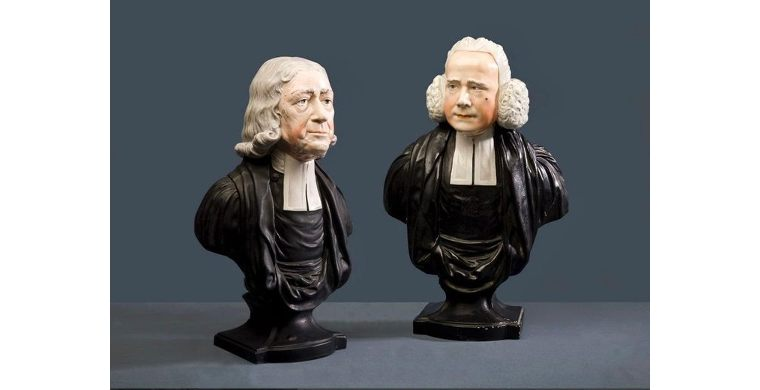"You Cannot be a theological Arminian and be Anglican"
By Chuck Collins
www.virtueonline.org
February 2, 2023
I don't see how someone can be a theological Arminian and be Anglican. February 2, 1738 is the day when George Whitfield left England for Georgia to begin his ministry in America. This got me thinking about how different Whitefield and his contemporary, John Wesley, were. They represent the irreconcilable differences between Reformation theology and Arminianism. I wonder if the two theological schools, in large part, explains the confusion we see today in Anglican Churches?
To ask it differently, does an honest person have to admit that we have outgrown the Articles of Religion (Anglican's confession), the Homilies, and the Book of Common Prayer in order to find a happy home in Anglicanism, or is the hope for our future in the teaching of Holy Scripture as understood and preserved in the historic formularies that are decidedly against Arminianism (and it's antecedents: Medieval Roman Catholicism and Pelagianism)?
It's nice sentiment, but not helpful, what Charles Simeon said: "No dissenter dares to preach as I do, one day Calvinist and another day Arminian, just as the text happens to be." This denies the theological differences between the two and the fact that Arminianism was invented specifically to oppose Calvinism. And I understand that William White, the founding father of the Episcopal Church, in his race for unity and peace, succumbed to the idea of "nationalism" to explain Article XVII (Predestination) away from its individualistic application. And I know that such leaders as Lancelot Andrewes and William Laud snuck into the Arminian camp in the dark of night taking many others with them, resulting in a predominantly Arminian message in Anglican pulpits today.
So, is the problem me? Is someone who still holds to the historic Anglican formularies crazy to think that Arminianism constitutes a departure from historic Anglicanism?
There is no equivocation in what the English reformers taught and died for: the bondage of the human will in sin (Article X), salvation by grace through faith alone apart from works or deservings (Article XI), and predestination as a sweet, pleasant and unspeakable comfort (Article XVII). But John Wesley, the famous circuit-riding evangelist, progenitor of holiness clubs and eventually the Methodist denomination, would not have any of these reformed teachings. As Arminians do, Wesley preached that salvation is significantly about human free will, that Christianity is the synergistic activity of God in cooperation with men and women, and that predestination is "a doctrine full of blasphemy" (his words) because it undercuts the biblical mandate to evangelize.
Both Whitefield and Wesley became famous preachers in their day, but their messages couldn't have been more different. Whitefield was deeply committed to the English Reformation understanding, and Wesley made his home in Arminianism. In the way we talk about free will and "I have decided to follow Jesus" revivalism, it is easy to see that our default position today is Arminian.
We are hardwired for self-determination and self-righteousness, but the good news that St. Paul is not ashamed to preach is the announcement of Christ's life, death, and resurrection in fulfillment of the Old Testament. If it is really true that "God, you know that we have no power in ourselves to help ourselves..." (Cranmer's Collect for Lent), this is a cry for power and righteousness outside ourselves found only in Christ, who, by the agency of the Holy Spirit, brings us to faith, repentance, and assurance. God doesn't help those who help themselves, he brings dead people back to life. He is our salvation and we contribute nothing to his finished work but our sins. We love because he first loved us! The old hymn writer got this right:
I sought the Lord, and afterward I knew
He moved my soul to seek him, seeking me;
It was not I that found, O Saviour true,
No, I was found of thee.
Thou didst reach forth thy hand and mine enfold;
I walked and sank not on the storm-vexed sea,--
'Twas not so much that I on thee took hold,
As thou, dear Lord, on me.
I find, I walk, I love, but, O the whole
Of love is but my answer, Lord, to thee;
For thou wert long beforehand with my soul,
Always thou lovedst me.














